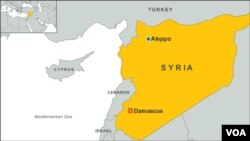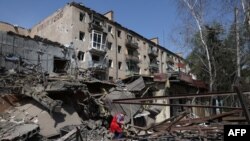ຊາວເຜົ່າອາເມເນຍທີ່ລົບໜີຈາກຊີເຣຍ ກຳລັງພົບເຫັນເສັ້ນທາງປອດໄພໄປສູ່ບ້ານເກີດ ເມືອງນອນບັນພະບູຣຸດເຂົາເຈົ້າ ບ່ອນທີ່ເຂົາເຈົ້າໄດ້ຖືກຕ້ອນຮັບ ຕັ້ງຖິ່ນຖານ ແລະໃຫ້ ເປັນສັນຊາດໃນບໍ່ເທົ່າໃດເດືອນທີ່ຈະມານີ້.
ການເດີນທາງຂອງເຂົາເຈົ້າກົງກັນຂ້າມກັບ ບັນດາອົບພະຍົບຊີເຣຍຫລາຍລ້ານຄົນທີ່ ພາກັນລົບໜີ ສູ້ທົນຕໍ່ຄວາມຍາກລໍາບາກຂອງການຕັ້ງຖິ່ນຖານຢູ່ໃນຕ່າງແດນ ຫລັງຈາກ ການເດີນທາງອັນລຳບາກ ໂດຍສະເພາະໄປສູກຣິສ ແລະເທີກີ.
ນັກເຄື່ອນໄຫວດ້ານສັງຄົມ Ara Sisserian ຜູ້ທີ່ຢູ່ Yerevan ນະຄອນຫລວງເອເມເນຍ ແລະເປັນປາກກະບອກສຽງໃຫ້ແກ່ຜູ້ໄປຮອດໃໝ່ຈາກຊີເຣຍ ກ່າວວ່າ “ອາເມເນຍເປັນ ບ້ານເຮືອນຂອງທັງໝົດທີ່ມີພື້ນຖານເປັນຊາວອາເມເນຍ. ຊາວອາເມເນຍທີ່ມາຈາກຊີ ເຣຍ ມາທີນີ້ເພາະວ່າ ເຂົາເຈົ້າຖືວ່ານີ້ເປັນບ້ານເກີດເມືອງນອນຂອງເຂົາເຈົ້າ.” ນັບແຕ່ ເລີ້ມມີການຄັດແຍ້ງຢູ່ໃນຊີເຣຍໃນປີ 2011 ເປັນຕົ້ນມາ ສັນຊາດຊີເຣຍຫລາຍກວ່າ 17,000 ຄົນ ທີ່ມີເຊື້ອສາຍອາເມເນຍໄດ້ກັບຄືນມາອາເມເນຍ. ອ້າງອີງຕາມ ຫ້ອງການ ຂ້າຫລວງໃຫຍ່ຝ່າຍອົບພະຍົບສະຫະປະຊາຊາດ (UNHCR)ແມ່ນວ່າ ຫລາຍກວ່າ 80 ເປີເຊັນຍັງຄ້າງຄາ ແລະໄດ້ຮັບການຄູ້ມ ຄອງຢູ່ໃນອາເມເນຍ
Ethnic Armenians fleeing Syria are finding safe routes to their ancestral homeland where they are welcomed, resettled and provided citizenship in a few months.
Their journey is in sharp contrast to the plight of millions of other Syrian refugees who endure difficulties being resettled in foreign lands after perilous journeys, mainly to Greece and Turkey.
"Armenia is home to all people of Armenian background," said civic activist Ara Sisserian, who lives in Armenian capital Yerevan and advocates for newcomers from Syria. "Those Armenians coming from Syria come here because they consider this as their motherland."
Since the beginning of the Syrian conflict in 2011, more than 17,000 Syrian citizens of Armenian background have arrived in Armenia. More than 80 percent have remained and found protection in Armenia, according to the U.N. Refugee Agency (UNHCR).
The numbers are miniscule when compared to the more than three million Syrians who fled abroad, analysts say, and that makes efforts to resettle them in Armenia more manageable.
90 Armenian churches destroyed
Christians of Armenian background have had a long history in Syria. Many families' ancestors arrived in the country escaping persecution during the Ottoman Empire. They have lived in Raqqa, Hasaka and Aleppo for hundreds of years.
But as Syria's civil war unfolded, Armenians faced religious and social persecution, analysts say.
"The Armenian population has dramatically dropped" the Rev. Haroutioun Selimian, head of a relief organization for Syrian Armenians in Aleppo, told VOA. "Their rights are being violated and their lives are at risk… Ninety Armenian churches are completely or partially destroyed."
And in areas under control of the Islamic State, Armenians face increased peril.
"With the rise of extremists, being a non-Muslim minority is the last thing you want to be in Syria now," Sisserian said.
IS militants have imposed a set of strict rules on Christians, forcing them to adhere to Muslim dress codes and to pay Jizya, an Islamic form of taxation designed for non-Muslims to live in Islamic territories.
IS has also confiscated their land and used them as human shields to deter international coalition and Syrian warplanes from hitting its positions in Raqqa and elsewhere.
"Christians are the most vulnerable group in the country," said Hussam Issa, an activist with "Raqqa is Being Slaughtered Silently", a group that monitors IS activities in the city.
Routes to freedom
Initially the first flow of refugees to Armenia came from the Syrian city of Aleppo, where nearly 40,000 ethnic Armenians lived, in late July and early August of 2012.
"The primary route was the weekly direct flights between Aleppo and Yerevan," said Sarkis Balkhian, a board member of the U.S.-based Aleppo Compatriotic Charitable Organization.
After the shutdown of the Aleppo International Airport in 2013, leaving became more difficult.
Fleeing Syrian Armenians now take underground smuggling routes using taxies and trucks that other Syrian refugees use.
But they usually head to Lebanon rather than Turkey because of the embittered history between Armenia and Turkey.
Once in Lebanon, Syrian Armenians connect to a social group set up by Armenia groups and funded by donations from the Armenian diaspora in Europe and the U.S.
"Contrary to advice from our local Armenian leaders asking us to stay, my husband and I lost our patience and fled Aleppo in late December," said Adriana Aessianians, a Syrian Armenian refugee from Aleppo who recently settled in Yerevan.
"We drove our car all the way to the border. With the help of an Armenian underground escape network, we managed to cross the border. After spending almost three months in Lebanon, we flew to Armenia," she told VOA.
Now she said she feels safe away from IS fighters who were approaching her neighborhood when she fled. Aessianians and her husband have applied for Armenian citizenship and they are expecting to get it within months.
The United Nations is seeking more money to help the refugees, saying $6.4 million is needed for resettlement efforts.
Despite the recent outbreak in violence between Armenia and Azerbaijan in Nagorno-Karabakh the worst since 1994 Syrian Armenians have little pause as to whether they should flee Syria, activists say.
"For them, Armenia is still better than Syria and other countries with conflicts," Sisserian said.










